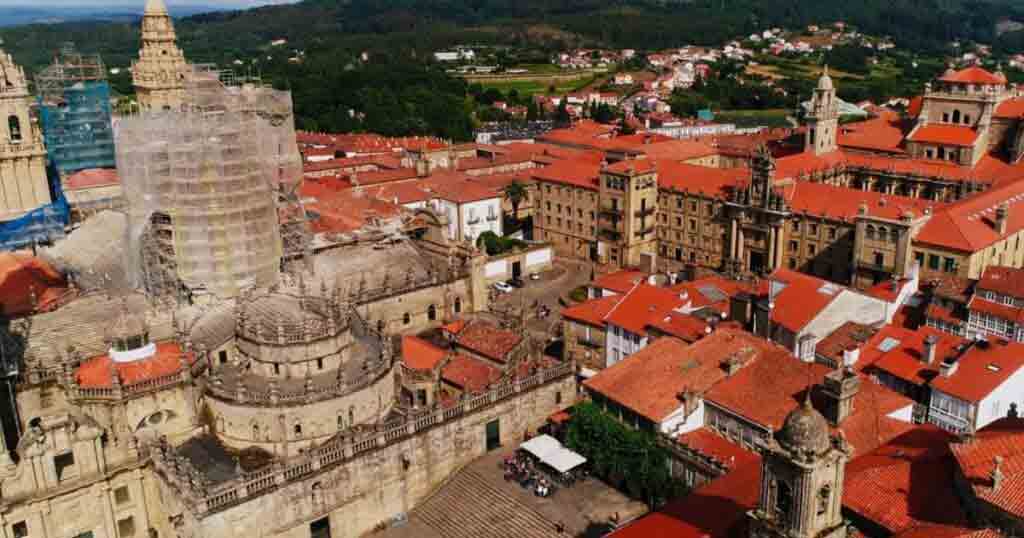Get to know the Galician expressions that cross the Camino de Santiago
As good lovers of the Camino de Santiago and Galicia, we would like to show you some of the most popular Galician words in the rest of Spain. Galician has conquered hearts beyond its borders with its melodious sonority and historical roots, finding a special place in the hearts of those who explore Spain's linguistic diversity. If you have travelled to Galicia, you may have heard that "the bread is stale". or expressions such as "marcho que teño que marchar" (I'm leaving, I have to leave) o "nunca choveu que non escampara" (I never knew it wouldn't rain) to refer to the fact that bad patches always end up passing.
In this post, we will talk about twelve Galician words and expressions that attract everyone who visits Galicia.

1. Homesickness
Morriña is the quintessential word that has crossed borders, one of the most commonly used by those who are not Galician. It does not have an exact translation in Spanish, but it refers to a deep melancholy or nostalgia, especially for the land of one's birth. This word captures the essence of longing and resonates with those who have experienced separation from home and loved ones.
2. Afouteza
The term "affouteza" has become the motto of the football team Real Club Celta de Vigo and its anthem which says: o teu lema é nobre xogo, afouteza e corazón. It is one of the most searched words in the Real Academia Gallega and in 2017 it became Word of the Year, an initiative to disseminate the Galician lexicon. It refers to someone's self-confidence, bravery, courage.
3. Riquiño/a:
This word, widely used by the Galician people, especially to indicate that someone is "he/she is not handsome, but he/she is rich".. A riquiña/a can be someone who is lovable, nice or a good person. When you call someone riquiño/a, you are using it as an affectionate diminutive to express appreciation or tenderness towards that person. It is a word commonly used in family and close relationships.
4. Furancho
Furanchos are small places where locals serve homemade wine and local produce. This word embodies the essence of Galician tradition and gastronomy, and has captivated lovers of good food all over Spain. On the Portuguese Way you can find this type of establishment, as the coastal area has more tradition.
5. Meigallo
This word refers to the magic of good luck. The meigallo is a kind of charm that is believed to attract good luck. This word has resonated far beyond Galicia, finding a place in the everyday conversation of those who seek a touch of fortune in their lives.
6. Rianxeira
Rianxeira is a word that evokes seafaring life and fishing tradition. It is an anthem in Galicia that speaks of the charm of the sea and tradition. With Galicia's intrinsic connection to the sea, this word has found admirers among those who appreciate coastal culture.
7. It will be bad:
It is an expression of hope, being the queen of Galician expressions. It is used to indicate that, despite adversity, we must always be optimistic. When something bad happens or something worries you, you will hear a Galician say "bad it will be".
8. Enxebre:
It is a difficult concept to explain to non-Galician speakers; it refers to the traditional, the authentic, especially when it refers to cultural aspects, customs or elements of Galician rural life. For example, if a house is described as "enxebre means that it is a traditional and typical Galician house, with characteristics typical of Galician rural architecture. If you are on the Camino de Santiago and you come across a bar "enxebreYou must go in, because it is probably the best place to eat or drink something typical of the area.
9. Be a toxo:
Toxo is one of the most representative plants of Galicia, with thorns and yellow flowers. This expression is used to refer to someone who is complicated or difficult to deal with. It can refer to a rude or surly person when dealing with others. A metaphorical comparison is made with this thorny bush, to describe a person's character. However, if you are called toxiño, it means that you may be rude in some situations, but deep down you are very cuddly.
10. Sentidiño:
It became the Galician Word of the Year in 2019, chosen by a vote in the Portal das Palabras. To do something with sentidiño means to do it with prudence, with care. It refers to common sense; it is very typical to hear Galician mothers in particular tell a child to "vai con sentidiñoThe aim is to make sure that nothing happens when I go out there.
11. Chegar e encher:
This expression is often used to refer to someone who achieves something on the first try. For example, if you finish the stage of the Camino de Santiago and you arrive at a bar where there were no free tables, and it turns out that there is just one free table left, that is "chegar e encher. If you go to the beach in the middle of July and you get a parking space the first time, you could say that it was "chegar e encher.
12. Se chove que chova
This expression has been a resounding success in an advertising spot for Gadis supermarkets in a campaign to spread love for one's own roots and the Galician fighting spirit. It means that we make do with what comes, and if the weather is not good, then we have no choice but to accept it.
Conclusions
To explore Galician words is to immerse oneself in the linguistic and cultural richness of this fascinating autonomous community. These ten words and expressions have built a bridge between Galicia and the rest of Spain, crossing borders and winning the affection of those who seek beauty in the subtleties of language. We hope you enjoy it and that you use some on your next trip to Galicia!
